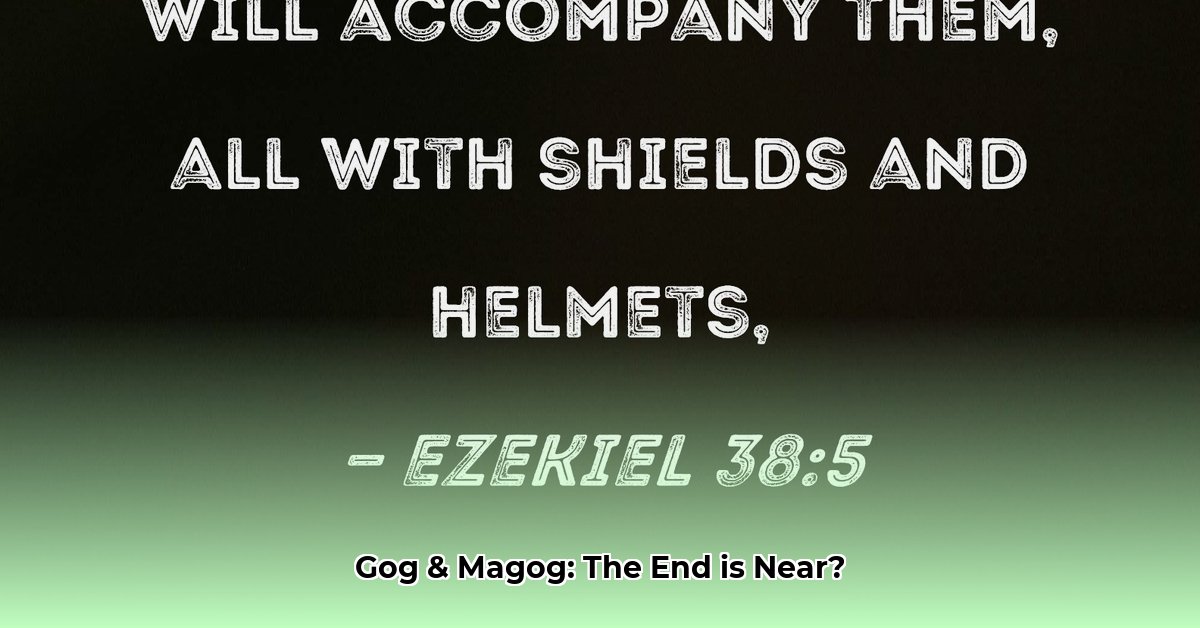
Ezekiel 38 Explained: Delving into Gog and Magog's Enigma
Ag shame, Ezekiel 38! This chapter's been a puzzler for ages, leaving everyone from Bible students to everyday folk wondering, "What's the deal with Gog and Magog?" Is it a real war on the horizon, or is there a deeper meaning? This article explores the different interpretations of this ancient prophecy, looking at who Gog and Magog might be – specific countries, or something more symbolic? We'll unpack whether it's literally about a future battle, or if it holds a different message, examining various expert opinions. Importantly, we'll uncover what Ezekiel 38 reveals about God's power and its enduring relevance today. No complicated theological jargon, just plain talk.
The Prophecy's Narrative: A Storm Brewing
Ezekiel 38 presents a dramatic scene: a massive army, led by Gog of Magog, preparing to attack Israel. This isn't just any army; it's a diverse, powerful force, unlike anything seen before. But who is Gog? And what's the meaning of Magog? These are the questions that have intrigued scholars and believers for centuries. The passage describes a meticulously planned invasion of a seemingly defenceless Israel. But God intervenes decisively—this divine intervention is the prophecy's core. It's not just a military clash; it's a colossal spiritual battle, a showdown between good and evil, with the outcome already determined. Is this a literal prediction of a future conflict, or something else entirely?
Unpacking the Interpretations: Diverse Perspectives
Interpreting Ezekiel 38 requires exploring various perspectives. A common view is the literal interpretation: Gog and Magog represent a future alliance of nations, perhaps including Russia, launching a final assault on Israel. Proponents often point to geographical details in Ezekiel's description. This view often aligns with end-times scenarios. However, a purely literal approach raises questions about precise timing and geopolitical interpretations.
Another approach is the symbolic interpretation. Here, Gog and Magog represent the ongoing opposition to God's people throughout history—those who defy God's plan and His chosen people. This view sees the prophecy not as a specific future event, but as a recurring theme in different historical periods.
Finally, a historical approach attempts to link Gog to past enemies of Israel. However, this can be problematic, struggling to reconcile all the details of Ezekiel's prophecy with specific historical events.
| Interpretation Type | Description | Strengths | Weaknesses |
|---|---|---|---|
| Literal | Gog & Magog are a future powerful coalition of nations, possibly including Russia, attacking Israel. | Clear and easily understandable; connects with popular end-times theories. | Debatable geographical details; uncertain timing; potential for misinterpretation and extremism. |
| Symbolic | Gog & Magog symbolize the consistent opposition to God and His people throughout history. | Offers a consistent theological message; adaptable to various historical periods. | Might lack the sense of urgency; may not fully capture the dramatic imagery of the prophecy. |
| Historical | Gog represents specific historical enemies of Israel. | Links the prophecy to events within a known historical framework. | Often struggles to fit all details accurately with real-world historical events. |
God's Sovereignty: The Enduring Message
Regardless of interpretation, one truth remains paramount: God is sovereign. He controls the narrative. He protects Israel, and ultimately, good triumphs. The prophecy, therefore, isn't just about geopolitical events – it’s profoundly spiritual. It highlights God's faithfulness to His promises, offering comfort and strength to those facing opposition. It challenges us all to contemplate true power and ultimate victory. The core lesson is God's ultimate control and His decisive triumph.
How to Interpret Ezekiel 38's Gog and Magog Prophecy Responsibly
Key Takeaways:
- Ezekiel 38-39 describes a massive invasion of a restored Israel, with details open to interpretation.
- Identifying Gog and Magog and the timing sparks debate, with multiple viewpoints.
- Interpretation demands careful textual analysis and historical awareness.
- Avoid using the prophecy to justify harmful actions or extremist ideologies.
- Focus on the overarching themes of God's sovereignty and ultimate victory.
Navigating the Minefield: Responsible Interpretation
The challenge lies in preventing misinterpretations that fuel extremism. Some groups misuse Ezekiel 38-39 to justify violence or hatred – a grave misreading. The prophecy is not a call to arms, but an affirmation of God's ultimate control and His victory over evil. Responsible interpretation emphasizes God's sovereignty, not human conflict; His protection of Israel, not political agendas.
A Balanced Approach: Spiritual Focus
Instead of speculation, concentrate on the enduring spiritual lessons. Ezekiel 38-39 teaches us about:
- God's unwavering protection: God's faithfulness to His people remains unshaken despite threats.
- The ultimate triumph of good: God will ultimately prevail, regardless of the enemy's power.
- The importance of repentance: The passage suggests the need for national and individual repentance.
- God's judgment on wickedness: Evil will not go unpunished.
By focusing on these spiritual themes, we can avoid extremism and engage thoughtfully with Ezekiel 38-39, letting its timeless lessons shape our faith, not our politics.